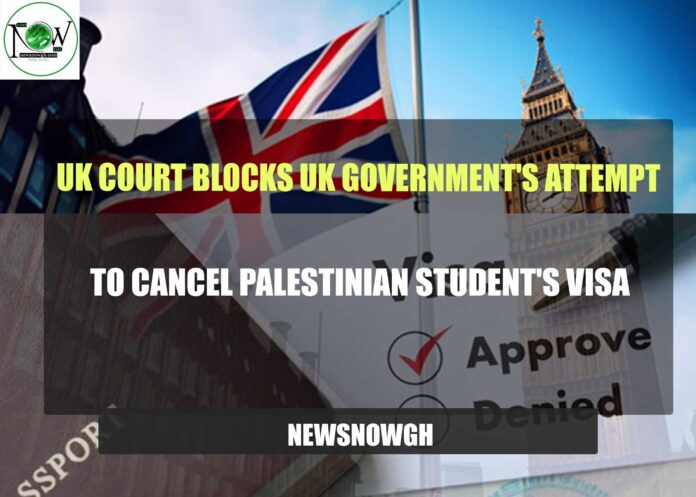UK Court Blocks UK Government’s Attempt to Cancel Palestinian Student’s Visa
A recent ruling by a UK court has ignited significant discussions about freedom of expression, national security, and the rights of international students. This decision blocked the UK government’s attempt to revoke the visa of Diana Abubakar, a Palestinian student labeled a national security threat by the UK Home Office due to her public support for Palestinian resistance.
This case underscores vital issues surrounding the boundaries of free speech, international law, and how government authorities handle such matters.
The UK Government’s Attempt to Cancel the Visa
Diana Abubakar, a dual citizen of Canada and Jordan, was taken aback when she received a letter from the UK Home Office. This letter informed her that her student visa had been revoked. The Home Office classified her participation in a pro-Palestine rally and her supportive statements regarding resistance as sufficient grounds to label her a national security threat.
This designation triggered an attempt to cancel her student visa based on the belief that her actions indicated support for terrorism. However, Abubakar’s legal team argued that the UK Home Office had unjustly infringed upon her right to free expression, a right protected by the UN Human Rights Charter.
Court Ruling Upholds Human Rights
At the Manchester Court, Judge Mel Plimmer delivered a crucial verdict. She emphasized that the UK government’s actions had violated Abubakar’s human rights. In her ruling, Judge Plimmer stated that Abubakar’s support for Palestinian resistance did not equate to endorsing terrorism or specific groups like Hamas.
Moreover, she clarified that Abubakar lacked clear knowledge of any specific role Hamas played in recent events. Thus, the court concluded that she could not have intended to support any violent actions.
Reinforcement of Palestinian Rights and Freedom of Speech
Following the court’s ruling, Diana Abubakar expressed her satisfaction. She stated that the decision reinforced the rights of Palestinians to resist occupation. Abubakar stressed that support for their cause should not be conflated with terrorism. This ruling has set an important precedent for the Palestinian movement and international students facing similar challenges.
In her response, Abubakar highlighted that the judgment affirmed Palestinians’ right to lawful resistance. She also emphasized the need for unbiased decision-making by government officials.
Legal and International Perspectives on the Case
The European Legal Support Center (ELC) praised the court’s decision, characterizing it as a landmark moment in UK jurisprudence. According to the ELC, this ruling counters the UK Home Office’s consistent attempts to associate pro-Palestine solidarity with terrorism and anti-Semitism.
They noted that this ruling should enhance protections for those advocating for Palestinian rights under international humanitarian law, even amidst potential changes in government. New Home Secretary Yvette Cooper upheld the initial decision, revealing continuity in policies regarding Palestinian advocacy.
This case between Diana Abubakar and the UK Home Office highlights the delicate balance governments must maintain between national security and the preservation of individual rights. For Abubakar, the ruling represented a personal victory and a significant step forward in protecting free speech and human rights in the UK.
Broader Implications of the Ruling
The implications of this ruling extend beyond Abubakar’s situation. It sends a clear message about the importance of safeguarding freedom of expression, especially in politically charged contexts. The decision underscores the necessity for governments to carefully consider how their actions may impact individual rights and freedoms.
Such rulings can inspire other international students who may fear repercussions for expressing their political beliefs. By upholding Abubakar’s rights, the court has set a precedent that could influence future cases involving student visas and political expression.
The Role of Advocacy Groups
Advocacy groups play a critical role in this landscape. Organizations that support human rights and free speech now have a stronger basis to argue against government overreach. They can leverage this ruling to advocate for policies that protect the rights of students and activists.
Furthermore, these groups can encourage more individuals to speak out about their beliefs without fear of reprisal. The ruling reminds us that legal frameworks can protect dissenting voices, particularly in sensitive political situations.
The Importance of Public Discourse
Public discourse surrounding this case has also been significant. The discussions it has sparked highlight the need for broader conversations about national security and civil liberties. As governments navigate these complex issues, public scrutiny can help ensure that individual rights are not overlooked.
Engaging the public in these discussions helps create a more informed citizenry. When individuals understand the implications of government policies, they can advocate more effectively for their rights and the rights of others.
Conclusion
In conclusion, the UK court’s decision to block the government’s attempt to cancel Diana Abubakar’s visa is a significant victory for human rights and freedom of expression. This ruling not only affirms the rights of individuals to express their political beliefs, but it also sets a precedent for future cases involving international students.
As this case unfolds, the implications will continue to resonate within the realms of law, education, and human rights. The ruling serves as a powerful reminder of the importance of maintaining a balance between national security and individual freedoms.
For international students and advocates alike, this decision highlights the need to remain vigilant. As political landscapes shift, the commitment to protecting human rights and free speech must remain steadfast. By fostering informed public discourse and advocating for justice, society can work towards ensuring that individual liberties are upheld in all circumstances.
Follow us on Newsnowgh.com to stay updated on the latest information regarding work permits, visas, and visa-sponsored employment.


